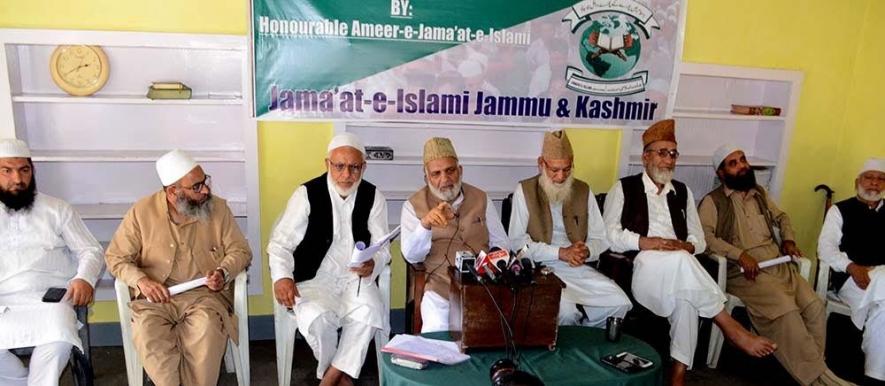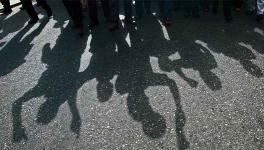Will the Ban Turn out to Be Helpful for Jamaat?

Image Coutesy: Valley Online
Ahead of Lok Sabha elections and following the Pulwama terror attack, the Government of India has invoked a ban on Jamaat- e- Islami (JeI) in the state of Jammu and Kashmir for allegedly supporting armed rebellion in the conflict-ridden region. The ban comes almost a week after dozens of JeI leaders, including its leader Abdul Hamid Fayaz, were arrested in a long-night raid by security forces. The arrests followed the deadly attack in Pulwama, where an explosive-laden car rammed into a CRPF convoy, killing at least 40 personnel.
In a notification issued by the Ministry of Home Affairs, dated February 28, 2019, it was stated that the centre government is of the opinion that, “JeI is in close touch with militant outfits and is supporting extremism and militancy in Jammu and Kashmir and elsewhere.” It further stated, “JeI is involved in anti-national and subversive activities in the country intended to cause disaffection.” However, this is not the first time that JeI is being proscribed, the organisation which founded in 1942, has already faced two bans.
Also Read: BJP Moves Seamlessly into Election Mode
It was first banned in 1975, as it opposed the Indira- Abdullah accord, by calling it a “gross violation of UN resolutions on Kashmir issue.” The second time JeI was banned was in 1990, however, the ban was lifted in 1993. The ban has elicited an array of reactions from locals and regional political parties. Former Chief Minister and People’s Democratic Party supremo, Mehbooba Mufti took to Twitter to protest against the decision. In her tweet, she said, “Why is GoI so uncomfortable with Jamaat e Islami? Radicalised Hindu groups representing fringe elements are given carte blanche to spread misinformation and vitiate the atmosphere. But an org that has worked tirelessly for Kashmiris is banned. Is being anti BJP anti national now?”
Former IAS officer Shah Faesal took to Facebook to express his view. In his post, he wrote, “In last few years, JeI J&K had transformed itself into more of a socio-religious than politico-religious organisation. The focus had shifted to education, welfare activities and humanitarian rescue and relief. I am surprised by the ban on JeI J&K at a time when the organisation has been trying very hard to move on. It is unfortunate that the Government’s Kashmir policy is being driven more by perception and hearsay rather than by data and evidence. This decision won’t help much in containing the situation in Kashmir. May good sense prevail.”
Few locals told NewsClick that the ban on JeI is going to affect the future of thousands of students who study in the schools run by the group. A socio-religious organisation, JeI, has a strong cadre base across Kashmir. A local, requesting anonymity said, “Long back, in the 90’s, Jamaat had disassociated itself from the armed rebellion. There is no solid evidence pointing to the allegations on the basis of which they have been banned. They have largely remained away from the armed militancy.”
Also Read: War Will Destroy Kashmir, Say Locals
Basharat Shameen, former English professor at University of Kashmir said, “The ban fits the BJP- RSS enterprise, that communal polarisation (for electoral calculations, of course) between Jammu and Kashmir must be sustained. And no surprises to who are the beneficiaries. Meanwhile, BJP also needs strong reasons for an election boycott in the valley, but the idiots don’t know that like the airstrike, this move will just go in the opposite. It means a sinking PDP will come alive again. It seems a deliberate push to aggravate things in Kashmir.”
Some people believe that the ban is going to help Jamaat emerge stronger in the valley. A local said, “The Jamaat’s open subscription to the Two Nation Theory will find more resonance within the valley, as they will cry religious persecution. In fact, their sympathisers and the Jamiat Talabha, students’ wing activists, are already crying of assault on the right to religious practice on social media.” Sources also told NewsClick that the centre had first thought of banning the JeI in 2016, but PDP reportedly thwarted it.
This ban has brought both Shia and Sunni Muslims, who share a history of differences, on the same page. Another local said, “That within Sunni Muslim, different organisations like Jamiat – Ahl- Hadith and other organisations have also condemned this ban. This has been regarded as an assault on their right to practice their religion.”
Get the latest reports & analysis with people's perspective on Protests, movements & deep analytical videos, discussions of the current affairs in your Telegram app. Subscribe to NewsClick's Telegram channel & get Real-Time updates on stories, as they get published on our website.
























